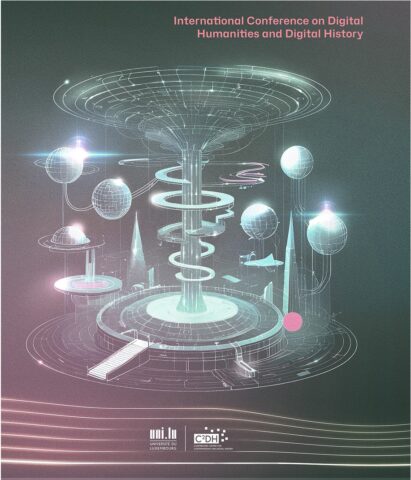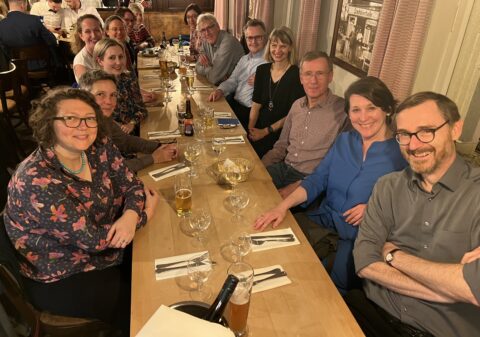イベント&アクティビティ
DIJ researchers at conference on Digital Humanities and Digital History
 DIJ researchers Harald Kümmerle and Nicole M. Mueller will participate in the international conference Exploring Epistemic Virtues and Vices: Data, Infrastructures, and Episteme between Collaboration and Exploitation in Luxembourg from March 14 to 16. Harald will deliver the keynote speech on “Epistemological challenges of doing research in/on Japan in the age of Digital Humanities”. Nicole will give her paper discussing “Epistemic Potentials and Pitfalls of Scalability” in the panel on Epistemic Virtues and Vices of Digital Research Practices. The conference is organized by the Luxembourg Centre for Contemporary and Digital History (C²DH) in collaboration with the German Historical Institute Washington, the Roy Rosenzweig Center for History and New Media, and the DIJ. Details here
DIJ researchers Harald Kümmerle and Nicole M. Mueller will participate in the international conference Exploring Epistemic Virtues and Vices: Data, Infrastructures, and Episteme between Collaboration and Exploitation in Luxembourg from March 14 to 16. Harald will deliver the keynote speech on “Epistemological challenges of doing research in/on Japan in the age of Digital Humanities”. Nicole will give her paper discussing “Epistemic Potentials and Pitfalls of Scalability” in the panel on Epistemic Virtues and Vices of Digital Research Practices. The conference is organized by the Luxembourg Centre for Contemporary and Digital History (C²DH) in collaboration with the German Historical Institute Washington, the Roy Rosenzweig Center for History and New Media, and the DIJ. Details here
Workshop explores relationship in human-machine interaction

When humans and machines interact, do they form (real) relationships? At the workshop Relationship in Human-Machine Interaction, six keynote speakers will share insights on the relationship-building aspects of humans and robots, avatars, or devices. Their talks will cover social psychology, media studies, computer science, and engineering viewpoints, including a presentation by DIJ researcher Celia Spoden on avatar robots as alter ego for hospitalized students. The talks and discussions are followed by the interactive workshop “Detour: Brand characters, tonalities, and emotions”. The event highlights the potential of technology to support communication, ease loneliness and decrease isolation, and enable new ways to organize work and life. All participants are invited to join the discussions and share their perspectives. The workshop is organised by the German Research Foundation (DFG) and the German Centre for Research and Innovation Tokyo (DWIH Tokyo). It is co-supported by the DIJ. Details and registration here
Barbara Holthus panelist at pet industry conference
 As part of her research on the sociology of pets in contemporary Japan, DIJ deputy director Barbara Holthus will participate in a panel discussion on the challenges resulting from the cohabitation of humans and pets in Japan’s super-aged society. The panel is part of an event organised by the Japan Animalpic Committee, an association that promotes the well-being of and interactions between humans and animals. Other panelists include former Minister of State Katayama Satsuki, pet activists Katsumata Kazuyoshi (Japan Animalpic Committee), Ito Hiroshi (Medical Ark School), Hosoda Nobuyuki (Japan Animalpic Committee), and dog trainer Ito Tetsuro. The event takes place on February 13 in Tokyo’s Office Building of the House of Representatives. Details and registration here (in Japanese)
As part of her research on the sociology of pets in contemporary Japan, DIJ deputy director Barbara Holthus will participate in a panel discussion on the challenges resulting from the cohabitation of humans and pets in Japan’s super-aged society. The panel is part of an event organised by the Japan Animalpic Committee, an association that promotes the well-being of and interactions between humans and animals. Other panelists include former Minister of State Katayama Satsuki, pet activists Katsumata Kazuyoshi (Japan Animalpic Committee), Ito Hiroshi (Medical Ark School), Hosoda Nobuyuki (Japan Animalpic Committee), and dog trainer Ito Tetsuro. The event takes place on February 13 in Tokyo’s Office Building of the House of Representatives. Details and registration here (in Japanese)
Online Study Group on Japanese Female Doctors in the Meiji Era

This online presentation offers a novel perspective on the historical study of education in Japan by focusing on Japanese female medical students in Germany. It will examine the educational experience of two pioneer females, Dr. Urata Tada (1873-1936) and Dr. Fukui Shigeko (1874-1961) who received their MD degrees from Marburg University. Upon returning to Japan, Urata became dean of Dōjin Hospital in Tianjin, China, and Fukui worked as an obstetrician and gynecologist at the Osaka Ogata Hospital. Urata and Fukui achieved a breakthrough in the status of female doctors in the Japanese medical profession. This presentation will argue for their roles in facilitating the dissemination of knowledge during Japan’s modernization in medical areas. Importantly, it offers insights into the reform of Japanese female higher education in modern Japan. Details and registration here
Wen-Wei Lan, Ludwig-Maximilians-Universität (LMU Munich)
Hybrid Study Group on Traffic Accident Disputes in Japan

Compared to other industrialized nations, the litigation rate for traffic accident disputes in Japan is remarkably low, leading to the widespread belief that the Japanese tend to avoid taking legal action. This has sparked a debate about the ‘legal consciousness’ in Japanese society. Julien Schickling will present research findings from expert interviews conducted with judges, lawyers, insurance companies, and dispute resolution institutions to shed light on the system for resolving traffic accident disputes in Japan. In addition, he will analyze the rise in litigation rates for traffic accident disputes in Japan observed since the early 2000s, with the aim of providing comprehensive reasons for this shift. Details and registration here
Workshop on communicative spaces in rural Japan and Germany

Rural areas in Japan have been facing challenges due to ongoing demographic decline and high rates of aging — but they are often also home to vibrant places offering space for deliberation, communication, networking, and political activities. While some of these spaces can be small in size, focusing on specific local problems, others may have goals reaching far beyond the local sphere. The DIJ workshop Conceptualizing communicative spaces in rural areas in Japan and Germany brings together scholars who have been analysing and conceptualising such spaces in their research in Japan and Germany. The speakers will present their research, followed by a discussion to conceptualize these dynamic spaces and to reflect on the differences between Japan and Germany. The aim of the workshop is to exchange ideas on how these places might help to deal with current challenges in rural areas and to establish a network of scholars and practitioners working on the topic. Details and registration here
Hybrid DIJ Forum on Women in Japanese Politics

Japanese politics has a woman problem. Not only are women relatively absent from legislative assemblies; when they run for elections, and even after they’ve won, they are often faced with sexual harassment. These issues seem particularly acute in local level assemblies, and even more so in rural areas. In Japan, 15.6% of local assembly seats are occupied by women, and only 2 of the 47 governors are women. This is in spite of the enactment in 2018 of a gender parity law, the Act on Promotion of Gender Equality in the Political Field. The speakers in this DIJ Forum will explore the causes of women’s under-representation in local politics and highlight the sexism experienced by women who campaign for and get elected to office. By considering institutional and cultural barriers, they will present a big-picture analysis of the problem of male-dominated politics in Japan. Details and registration here
Emma Dalton, La Trobe University
Naoko Oki, Sugiyama Jogakuen University
DIJ Alumni Meeting at VSJF Conference in Berlin

During this year’s annual conference of the German Association for Social Science Research on Japan (VSFJ) in Berlin, 14 current and former DIJ employees met for an alumni dinner. The photo shows (from left to right): Cosima Wagner, Isa Ducke, Elisabeth Köller, Ruth Achenbach, Michaela Oberwinkler, Gabriele Vogt, Ursula Flache, Momoyo Hüstebeck, Helmut Demes, Harald Conrad, Barbara Holthus, Hanns Günther Hilpert, Phoebe Holdgrün, and Axel Klein. At the conference’s sections meetings, several DIJ researchers and alumni gave research presentations, including current deputy director Barbara Holthus on animal abuse and PhD student Jasmin Rückert on photo albums of Japanese soldiers as well as alumni Michaela Oberwinkler (Düsseldorf) on emoji in digital communication, Steve R. Entrich (Duisburg-Essen) on effects of transnational experiences on the Japanese labour market, and Carola Hommerich (Sophia University) on changing attitudes towards environmental problems and climate change.

















 Open Access
Open Access
